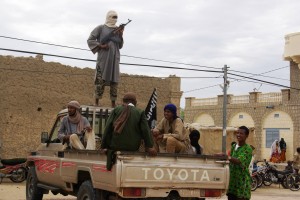A month has passed since the attack on a BP plant in Mali put hundreds of lives in danger and reminded the world Al-Qaeda still poses a viable threat.
On Feb. 20, Islamist extremists met with military forces in the northern city of Gao, and a car bomb went off in Kidal, another northern town.

Mali is under a deal of duress and conflict largely influenced by Al-Qaeda and Islamist extremist beliefs. Last December, the Malian president was arrested by the military in a nation-wide coup. Many events like this which occur in Mali, like genocides and government upheavals usually go by the unfortunate wayside. Yet this one takes a special stand in the limelight because of the link to the terrorist organization.
The U.S. has obvious interest in the situation considering an Al-Qaeda splinter group is leading the resistance. But how long can this be expected to last? What happens if Al-Qaeda reemerges as a power in Western Africa and there’s another problem on our hands with Anti-American beliefs?
Former Secretary of State Hillary Clinton said, “We are in for a struggle, but it is a necessary struggle,” signaling the U.S. is ready to aid, but it will not involve military forces. In a USA today article, White House officials said the level of assistance provided will not involve more troops:
Obama officials from the State Department and the Pentagon said the militias pose a significant threat to U.S. interests and security. But the United States will not send troops to aid the effort. “We are assisting the French; we are assisting the Africans, but we have no plans in engaging ourselves or putting boots on the ground,” said Johnnie Carson, assistant secretary of State for African Affairs.
Many countries including France and Russia are providing aid. Russian Foreign Minister Sergey V. Lavrov said their support is to help stop the spread of terrorism in North Africa.
According to Assistant Secretary Carson, the lack of economic development, the absence of meaningful opportunities for people to engage with the government and the looming threat for Northern Mali to become a terrorist safe haven make this situation more complex than is really understood. And without proper response, Carson said the current military efforts will be short lived.
Deputy Assistant Secretary Amanda Dory said the military has done everything within its power to help our French allies. As the representative of the Defense department, she said the end goal needs to not be a military effort from the U.S., but rather a United Nations peacekeeping effort. The complexity of the issue is too great for the U.N. to give a green light on any forces moving in now.




